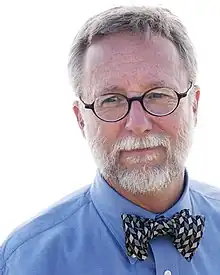
Gregg Herken is an American historian and museum curator who is Professor Emeritus of modern American diplomatic History at the University of California, Santa Cruz & Merced, whose scholarship mostly concerns the history of the development of atomic energy and the Cold War.[1]
Biography
In 1969, Herken received a B.A. from University of California, Santa Cruz.[2] In 1974, he received a Ph.D. in modern American diplomatic history from Princeton University.[3]
Herken held teaching positions at California State University, San Luis Obispo, Oberlin College, Yale University, and California Institute of Technology, and was a Fulbright-Hays senior research scholar at Lund University.[2][3] During 1988–2003 he was a senior historian and curator of military space, as well as chairman of the Department of Space History at the Smithsonian Institution's National Air and Space Museum in Washington, D.C.[2] He also served on the U.S. government's Advisory Committee on Human Radiation Experiments during 1994–95.[3] Since 2005, Herken has been a Senior Fellow at the Middlebury Institute of International Studies in Monterey, California.
Works
In 2003, Herken's book Brotherhood of the Bomb, for which he received a MacArthur Grant to write, was a finalist for the Los Angeles Times Book Prize in history.[2]
- —— (12 February 1981). The Winning Weapon: The Atomic Bomb in the Cold War 1945-1950 (1st ed.). Knopf. ISBN 978-0394503943. LCCN 80007643. OCLC 1154559530. OL 4094849M. Retrieved 10 November 2021 – via Internet Archive.[4]
- —— (12 March 1985). Counsels of War (1st ed.). Knopf. ISBN 978-0394527352. LCCN 84047876. OCLC 470805690. OL 2868891M. Retrieved 10 November 2021 – via Internet Archive.[5]
- —— (9 April 1992). Cardinal Choices: Presidential Science Advising from the Atomic Bomb to SDI (1st ed.). Oxford University Press. ISBN 978-0195072105. LCCN 91030281. OCLC 243726684. OL 1550563M. Retrieved 10 November 2021 – via Internet Archive.
- —— (9 September 2002). Brotherhood of the Bomb: The Tangled Lives and Loyalties of Robert Oppenheimer, Ernest Lawrence and Edward Teller (1st ed.). Henry Holt and Company. ISBN 978-0-80-506588-6. LCCN 2002017219. OCLC 890256840. OL 7932650M. Retrieved 10 November 2021 – via Internet Archive.
- —— (28 October 2014). The Georgetown Set: Friends and Rivals in Cold War Washington (1st ed.). Knopf. ISBN 978-0307271181. LCCN 2013047033. OCLC 917334657. OL 27170115M. Retrieved 10 November 2021 – via Internet Archive.[6]
References
- ↑ "GREGG HERKEN". University of California, Merced. n.d. Archived from the original on 10 September 2021. Retrieved 10 November 2021.
- 1 2 3 4 Peggy Townsend, "Gregg Herken: Unraveling history's mysteries", UC Santa Cruz, April 2, 2012
- 1 2 3 James Leonard, "History Professor Gregg Herken Creates Intriguing Courses Based on Scholarly Research", UC Merced, January 22, 2004
- ↑ Hewlett, Richard G. (1981). "Reviewed work: The Winning Weapon: The Atomic Bomb in the Cold War, 1945-1950 by Gregg Herken". The Journal of American History. 68 (3): 731. doi:10.2307/1902038. JSTOR 1902038.
- ↑ Greb, G. Allen (1986). "Review of Counsels of War by Gregg Herken". Science. 231 (4737): 504–505. doi:10.1126/science.231.4737.504. PMID 17776027. p. 505
- ↑ Yardley, Jonathan (November 7, 2014). "Book Review: The Georgetown Set: Friends and Rivals in Cold War Washington by Gregg Herken". The Washington Post.
External links
- Smithsonian Air and Space Wall of Honor page
- Brotherhood of the Bomb review by Washington Post
- Brotherhood of the Bomb review by the New York Times
- Brotherhood of the Bomb review by Physics Today